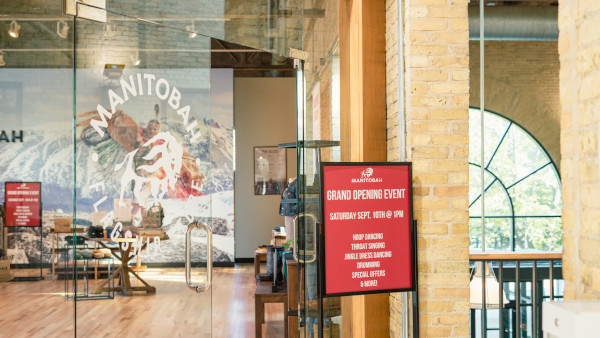Reactivating Indigeneity at the former fur-trade post
Manitobah Mukluks opens flagship store
Manitobah Mukluks’ new storefront at The Forks holds special significance given the location’s pre-colonial history. (Supplied photo)
The company kicked off the opening of their first permanent store at The Forks Market on Sept. 10 with performances by dancers, singers and community members.
Manitobah first launched in 1997, but founder Sean McCormick began envisioning the company when he was in high school. According to Lor Brand, Manitobah’s marketing coordinator, McCormick always had a spirit for business. In high school, he sold furs and hides for already-made moccasins and mukluks, effectively turning his campus into a trading post and continuing the cycle of trade.
Prior to Manitobah’s surge in popularity, McCormick sold his products to businesses as wholesale items from one local area. Today, Manitobah Mukluks are sold globally.
“We have products in multiple different countries. We’re selling in some of the biggest retailers in the world. We have our traditional mukluks sitting alongside brands like Prada and Ugg,” Brand says.
Manitobah’s products are all rooted in Indigenous culture, from the original designs on the soles of mukluks to the hand-crafted gauntlets made locally by Indigenous artists.
The reason “we do it is so that we can build a community and make positive impacts within our Indigenous communities. That’s always been the thread throughout all these years, along with celebrating the craft and artform of mukluks,” Brand says.
Today, there is such a high demand for Manitobah Mukluks that the company has gone international with their production. Manitobah now has the first fair trade footwear factory in Vietnam.
“We saw it as an opportunity to really build the business and be able to offer all of our classic products at an accessible price,” Brand says.
The decision to open a Manitobah Mukluks store at The Forks Market was obvious, Brand says. The new location allows people to physically try on Manitobah products in a safe, creative community space. Manitobah also plans to host workshops, activities and learning opportunities.
“We wanted a space for people like me, when I was a young beadworker, to see themselves in the success that Manitobah has had,” Brand says. “We want young Indigenous people to be able to walk in the store and see the artwork on the walls ... (and) see all the handmade (products) being sold for what (they’re) truly worth. We want them to feel really proud and confident that they can do this, too.”
The Forks’ history as an Indigenous meeting place and fur-trading post played a major part in Manitobah’s decision to open their new store there. Another important factor was that The Forks has been highlighting the importance of Indigenous voices and acknowledging the location’s pre-colonial history.
“We love all the work that Niigaan Sinclair, an Indigenous curator, has been doing at The Forks. He’s doing incredible work there, along with the whole team. It’ll be a community space, and those workshops won’t be going away,” Brand says.
Manitobah plans to host events similar to their grand opening, which will include performances by Indigenous dancers and singers.
For more information, visit manitobah.ca.
Published in Volume 77, Number 02 of The Uniter (September 15, 2022)







